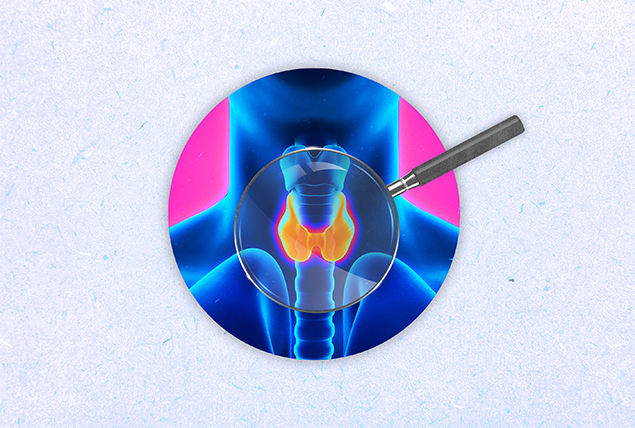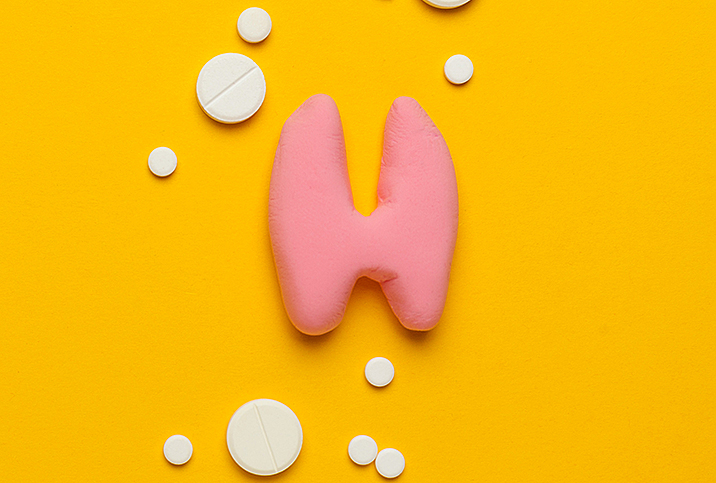What Are Some of the Root Causes of Hypothyroidism?

Key Points
- The thyroid is one of the most important hormone-secreting glands in the human body, releasing triiodothyronine (T-3) and thyroxine (T-4).
- Hypothyroidism occurs when several physiological functions are slowed because the body can't efficiently use energy.
- Women are five to eight times more likely to have thyroid problems, as are those with other related conditions that run in the family.
Inside the body, the endocrine system is accountable for producing and utilizing hormones. More than 50 hormones have been observed, each with its purposes and corresponding receptors.
One of the most important hormone-secreting glands is the thyroid, which releases triiodothyronine (T-3) and thyroxine (T-4). These two hormones act as fuel for all other cells in the body and are chiefly involved in growth, development, reproduction and metabolism.
T-3 and T-4 also regulate body temperature and heart rate, according to Alpana Mohta, M.D., a dual board-certified dermatologist in Bikaner, India. The delicate balance of T-3 and T-4 hormones is essential for the body to operate.
An underactive thyroid, a condition called hypothyroidism, can be dangerous because of the disruption it causes throughout the body. In the extreme, the long-term consequences of hypothyroidism can be life-threatening.
What is hypothyroidism?
Mohta described the thyroid as a small gland located in the neck below the voice box.
"The pituitary gland in the brain controls the amount of thyroid hormones in the bloodstream by producing thyroid stimulating hormone (TSH)," she said.
Hypothyroidism refers to abnormally low levels of circulating thyroid hormones, said Sarah Tedjasukmana, M.B.B.S., a specialist general practitioner in New South Wales, Australia.
In someone with hypothyroidism, several physiological functions slow down because the body can't efficiently use energy. This leads to a domino effect of conditions, potentially causing structural malformations, nutritional deficiencies, problems with conception and more.
With anatomy and physiology potentially being compromised, it's vital to properly identify and manage an underactive thyroid.
Left untreated, hypothyroidism leads the body to shut down and can in rare cases result in myxedema coma (MC), which is a potentially life-threatening condition.
Risks, causes and stages of hypothyroidism
Hypothyroidism is caused by primary or secondary factors, according to Mohta, and post-menopausal women over the age of 60 with hormonal imbalances are at the highest risk. Primary causes directly affect the thyroid gland and result in low hormone production. Secondary causes come from diseases in the hypothalamus or pituitary gland and transcend the thyroid.
When a patient's condition is present at birth, it is known as congenital hypothyroidism.
Many factors may lead a thyroid to become underactive.
"Common causes of hypothyroidism are Hashimoto's disease, environmental iodine deficiency, and surgery or removal of the thyroid gland," said Alyce Garth, a thyroid and autoimmune health and nutrition coach in Queensland, Australia. Garth has the autoimmune condition Hashimoto's thyroiditis.
Hashimoto's disease is thought to be a primary cause of hypothyroidism, but low iodine is the most common cause worldwide, according to Tedjasukmana. The numbers have declined recently due to the availability of iodized salt, but too much iodine can also lead to an underactive thyroid.
Two predispositions for disease development are gender and medical history.
Women are five to eight times more likely to have thyroid problems, as are those with other related conditions that run in the family, according to Mohta.
Medications such as lithium and amiodarone (an arrhythmia medication) can also be factors, Tedjasukmana added. Thyroid conditions are fairly common during pregnancy or the early postpartum period.
In rare cases, pituitary gland tumors can cause hypothyroidism because the pituitary gland is responsible for releasing thyroid-stimulating hormone (TSH).
In general, symptomology is prolonged, often spanning months or years, but some patients experience progression at faster rates. Subclinical hypothyroidism may lack adverse effects, and at times patients reach advanced stages of the disease before it's detected. In this case, the body has ample time to slow down and decline in functionality.
"As the disease progresses, individuals may experience a range of symptoms such as fatigue, weight gain and depression," Mohta said.
Recommended
- The Gift of Health—STI Tests: Prioritize awareness and stop letting shame dictate your healthcare.
- Are Multiple Dates a Night the Future of Dating?: There's efficiency in numbers. But having too many dates in one night may have its drawbacks.
- Between the Pages: 'Out of Touch' investigates the intimacy famine.
Facts, stats, studies and history
The term "thyroid" was first designated in 1656, but research suggests thyroid conditions were being treated as early as 2700 BCE. The gland was even depicted in Leonardo Da Vinci's anatomical drawings, as were the procedures of needle biopsies and thyroidectomies.
By 1958, synthetic thyroid medications were developed. Major pharmaceutical companies took over the innovative process of improving these medications during the 1970s.
In recent years, underactive thyroid incidence in America has increased and it's estimated that more than 12 percent of people will develop some type of thyroid condition in their lifetime.
Mohta noted that in the United States, up to 60 percent of the 20 million citizens with thyroid diseases remain undiagnosed.
In Australia, 1 million people face the same problem, according to Garth, and nearly one-third of patients with treated hypothyroidism still exhibit symptoms.
Current research strives toward a better understanding of the inner mechanisms of hypothyroidism to make connections to other ailments and develop improved treatments. For example, the National Institute of Diabetes and Digestive and Kidney Diseases (NIDDK) is conducting a five-year study due to conclude in 2024. It is looking at the effects of levothyroxine on cardiovascular health for people diagnosed with both hypothyroidism and chronic kidney disease (CKD) who are undergoing hemodialysis treatment for CKD.
A 2021 study suggested that combination therapy using desiccated thyroid extract (DTE) reduced troublesome symptoms and was congruently effective as levothyroxine alone. DTE has become a pioneering treatment for thyroid disorders.
The animal-based substance is suggested to have better outcomes because it contains both T-3 and T-4 hormones, whereas levothyroxine only has T-4. DTE is taken by mouth and maximal effects may take up to three weeks. Side effects may occur from excessive doses.
Myths, misconceptions and canines
Can men have hypothyroidism? Yes. Despite its much greater prevalence in women, hypothyroidism has negative consequences for men, too, including parallel fertility barriers. Unhealthy weight gain may be a notable feature of hypothyroidism, but the condition can't be alleviated with dietary habits alone.
If hypothyroidism is left unmanaged, people can find it more difficult to lose weight. Furthermore, no specific food groups are associated with the worsening of symptoms, though a dietitian may advise that people regulate their iodine consumption.
Hypothyroidism can also appear in dogs, sometimes presenting much as it does in humans, with fatigue, weight gain, cold intolerance and dermatological issues. Dogs who aren't spayed or neutered can suffer from reproductive interference. Similar to a dietitian's role, a vet may implement a specialized diet to promote good gut health.
Diagnosis and treatment are the same no matter the species of patient. Blood tests measure thyroid hormones and thyroid supplements help manage hormone levels.
You should not panic if a goiter or nodule is discovered on your thyroid. Only about 5 percent of nodules are malignant, and even if they are, the prognosis is generally excellent if they are detected early.
Nevertheless, being diagnosed with hypothyroidism is a serious matter. Even if thyroid hormone levels become stabilized, it is imperative to continue taking medication, as most patients will require it indefinitely for continued symptom relief.


















